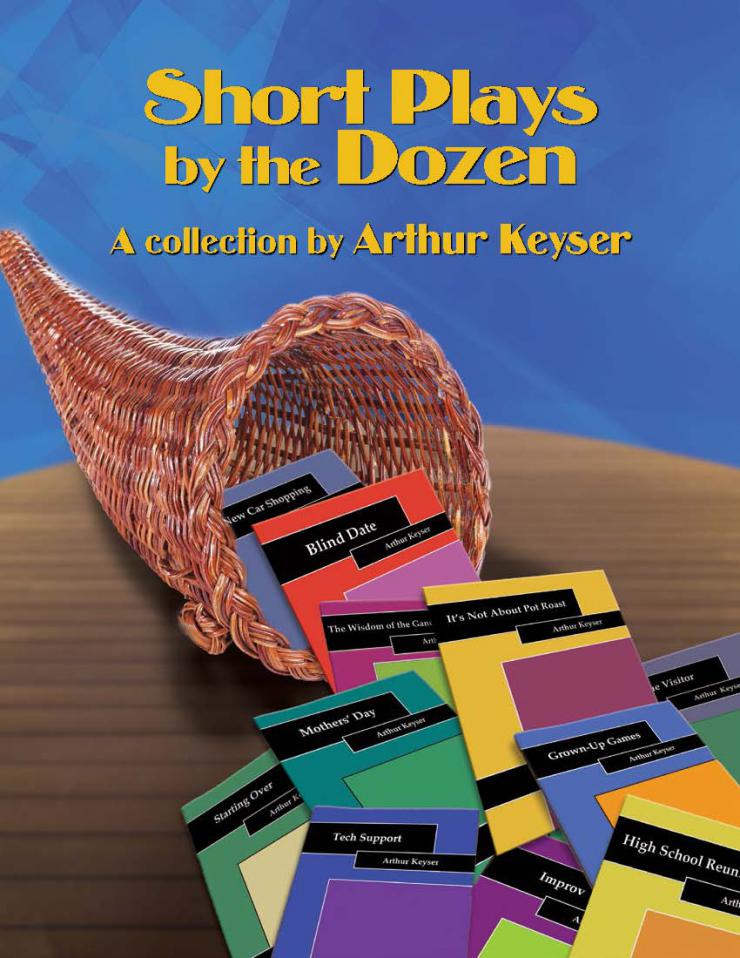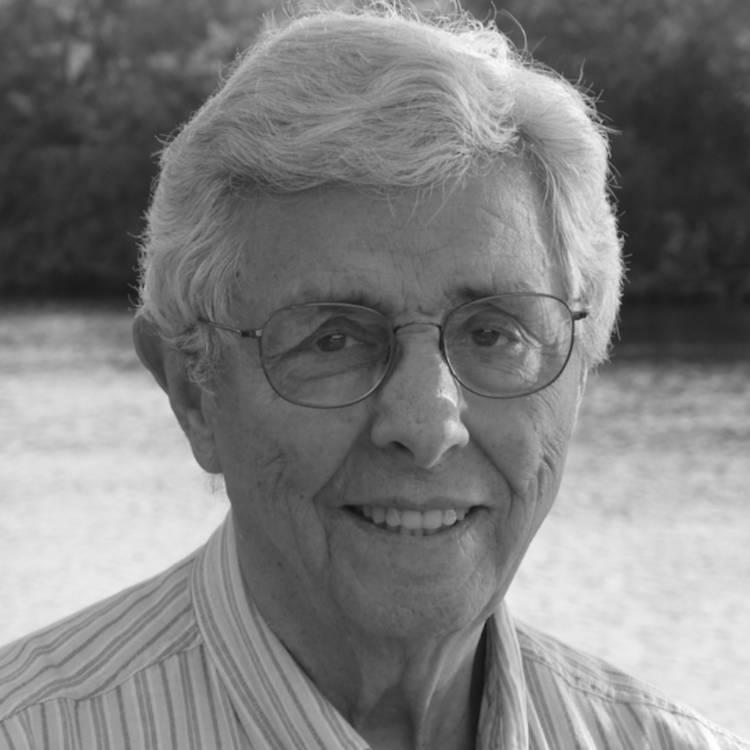An Interview with Arthur Keyser, Playwright
Where do older adults fit into our world today? This question is currently one of great concern, politically, socially, and artistically. The growing field of Senior Theatre is one bold response. Through this week's series, we'll explore the many facets of this small but growing field. These stories highlight the sometimes-hidden power of the eldest members of our community, and share how much they have to offer to the world through their art. Arthur Keyser—who started his writing career at the age of 80—is a playwright who has prolifically produced work for the Senior Theatre community. His most recent publication is Short Plays by the Dozen (ArtAge Publications). —Lynn Mullin
Lynn Mullin: Why did you decide to be a playwright?
Arthur Keyser: A defining aspect of my childhood was that both of my parents were born completely deaf. So from an early age, I was pretty much on my own. And from the time I learned to write, I was always writing. At the age of seventeen, I was accepted into the University of Pennsylvania and had saved enough money to pay for one semester. I joined the army and ended up spending almost a year and a half in Japan. I came home, and the GI Bill of Rights paid my way through college. After graduation I enrolled at the George Washington University Law School evening program; made the National Honor Society; was one of the editors of the Law Review; clerked in the US Third Circuit Court of Appeals for one year; and was then hired by a Philadelphia law firm. I eventually became one of the senior managing partners at the law firm.
At age seventy, I left the firm, where I had spent forty-five years, joined a prestigious law firm in suburban Philadelphia called Kaplin Stewart as a partner, and I retired from that firm at age seventy-five. I then moved to Sarasota, Florida with my wife, and found the adjustment from working intensively as a lawyer to retirement very difficult. I didn’t know what I wanted to do. I finally joined a senior theatre company here in Sarasota in 2009 and learned that I was a terrible actor—really awful. But while I was there, I began writing portions of sketches for their performances. That’s how I started. I was eighty years old, and had never considered writing a play before then. If someone had said to me at the age of seventy-five that I was going to be a playwright, I would have said, “You’re crazy!”
I remember when I was in college, a professor talking about psychic income in contrast to real money. It’s what you get out of what you do emotionally rather than what you receive in terms of financial rewards. I know I receive an enormous amount of psychic income out of writing.
Lynn: How have your life experiences informed the subject matter of your work?
Arthur: As a corporate lawyer, I travelled all over the world. I’ve met people in every kind of environment. I never write a play about an actual event that I’ve experienced. When I'm writing, however, many of those experiences, and the people I've met, will be the building blocks in crafting the plots and the characters in my plays.
Lynn: What do you feel characterizes your work as a playwright?
Arthur: First of all, I try very hard to make certain that none of my plays sound like any others I've written. And my goal is to always make each character’s voice within a play sound different from the voices of all the others. I’m a compulsive rewriter. It’s never a burden. I really love the process of looking at something and saying, “Hey, that’s not working.” I think that’s the secret to success in playwriting. Another thing that characterizes my plays is that most of them are humorous and are optimistic. I try to avoid anything that sounds pessimistic. The best part of writing and rewriting is that for me it’s always fun. It never feels like work. And fortunately, I don’t have to make a living out of it. I remember when I was in college, a professor talking about psychic income in contrast to real money. It’s what you get out of what you do emotionally rather than what you receive in terms of financial rewards. I know I receive an enormous amount of psychic income out of writing.

Lynn: Would you say that most of your protagonists are older adults?
Arthur: Oh yes—and the antagonists, and other characters in my plays. When writing, one should write what she or he knows best. Having reached eighty-six, I know much more about senior citizens than teenagers or young adults. My characters usually range from their fifties into their eighties. My oldest characters are in a play, which recently received the award as Best Play in the 2015 Theatre Odyssey Ten-Minute Play Festival here in Sarasota. It's called High School Reunion. The story is about a 101-year-old man who’s been going to his high school reunion at a restaurant every year since graduation. For the past seven years, he’s attended entirely by himself, believing he is the sole survivor in his high school class. But this year, a second man shows up at the reunion and tells the first character that he was in the same class. My protagonist doesn’t recognize, or believe the stranger. He thinks the new man is a con artist. And below the surface, he really prefers being the last man still standing. After a spirited argument, my protagonist is finally convinced that the new man is legitimate. The two, plus the maitre d' sing the school song, the lyrics for which I wrote; and as the play ends, the two have become good friends. They end the play planning their eighty-fifth reunion, two years away. Here they are at 101, planning for a celebration when they’ll be 103. I like to think that’s a pretty good example of optimism, which is pervasive in what I write.
Lynn: What impact do you hope your work has on those who perform it and on those who see it?
Arthur: I've been fortunate enough, through my publisher ArtAge, to have my plays performed throughout the country. Two years ago, my play Mothers' Day was performed by five women, who were living in a residence for retired nuns. The retirement community, located in suburban Philadelphia, is quite large and the five women ranged from seventy-five to ninety-two in age. They created a two-day arts festival with my play as the centerpiece of the festival. I have a DVD of their performance and a poster from that festival. It was the first time they had ever undertaken something like that. In phone conversations with the nun who organized the event, I was told how excited they were to perform the play in front of audiences of 200 people each evening. Experiences like that convince me that my plays can bring some joy to the lives of those seniors who perform them and pleasure for their audiences.
Lynn: What advice would you give other older adults who want to become playwrights?
Arthur: If someone wants to write plays as a hobby—as a pleasant diversion—then just do it, but don’t put pressure on yourself. The chance of real success in the field is so remote. However, if you’re really serious and you really want to write accessible plays, accumulate a library of playwriting books and take classes. Write, and write, and write. Have your plays read out loud in small groups. Accept criticism—if you can’t accept criticism, you can’t be a playwright. And be prepared to rewrite every play over and over again.

Lynn: You’ve just published your first anthology of short plays with ArtAge Publications: Short Plays by the Dozen, which are all written for actors over the age of fifty. What will your next project be?
Arthur: I'll continue with the next rewrite of my full-length play Before Steepletop. It’s a work of fiction, based on a part of the life of Edna St. Vincent Millay. She won the Pulitzer Prize for poetry and was, in many ways, a very tragic figure. It is not typical of the type of play I usually write. The play was recently selected for a reading at a festival at The Player’s Theatre in Sarasota, and after hearing it read on the stage, I realized it still needs a lot of work. I’m on the twenty-sixth draft of this play. I’ll keep rewriting it until I'm ready to submit it somewhere else and see where it goes. Meanwhile, I will also keep writing short plays for the annual Theatre Odyssey Festival here in Sarasota, other similar festivals, and submit to the next ArtAge catalog in 2018. I intend to write new plays as long as I am capable of tapping the keys on my keyboard.
Lynn: Is there anything else you’d like to add?
Arthur: Yes. So much of whatever success I've achieved is the result of a fortunate trip to a Senior Theatre annual convention in Ashville, North Carolina, shortly after I started writing plays. There I met Bonnie Vorenberg, the founder and President of ArtAge Senior Theatre Resource Center in Portland, Oregon. Bonnie is a uniquely talented woman with years of involvement in theatre, and she is the most knowledgeable person anywhere in the world of Senior theatre. Bonnie is my playwriting advisor, the publisher who has published twelve of my short plays, and the muse who sits on my shoulder as I tap away at my keyboard.
For more information on Arthur Keyser’s plays, visit http://www.seniortheatre.com/arthur-s-keyser/.













Comments
The article is just the start of the conversation—we want to know what you think about this subject, too! HowlRound is a space for knowledge-sharing, and we welcome spirited, thoughtful, and on-topic dialogue. Find our full comments policy here
An inspiring conversation and valuable contribution for theatre and the senior population. Thanks for posting.